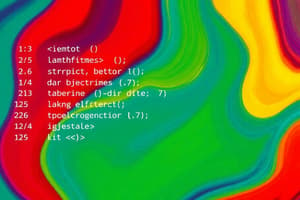Podcast
Questions and Answers
What is Java?
What is Java?
A popular high-level, class-based object-oriented programming language designed to be platform independent.
Which of these are characteristics of Java? (Select all that apply)
Which of these are characteristics of Java? (Select all that apply)
- Assembly language
- Object-oriented (correct)
- Rich standard library (correct)
- Platform independence (correct)
What does platform independence in Java mean?
What does platform independence in Java mean?
Java code is compiled into bytecode that can be executed on any platform with a compatible Java Virtual Machine (JVM).
What are primitive data types in Java?
What are primitive data types in Java?
What is a class in Java?
What is a class in Java?
What is the purpose of methods in Java?
What is the purpose of methods in Java?
What are access modifiers in Java?
What are access modifiers in Java?
Java's _____ management includes a garbage collector that prevents memory leaks.
Java's _____ management includes a garbage collector that prevents memory leaks.
The static modifier in Java indicates that a member belongs to the class rather than any instance of the class.
The static modifier in Java indicates that a member belongs to the class rather than any instance of the class.
Flashcards are hidden until you start studying
Study Notes
Java Programming Basics
- Java is a high-level, class-based, object-oriented programming language, designed for platform independence.
- Originally developed by Sun Microsystems and released in 1995; now owned by Oracle with over three billion devices running Java.
- Key features include platform independence, automatic memory management, multithreading, rich standard library, and built-in security.
Core Features
- Platform Independence: Java compiles code into bytecode, enables execution on any platform with a compatible Java Virtual Machine (JVM); adheres to the principle of “write once, run everywhere.”
- Object-Oriented: Utilizes objects and classes to structure code, promoting reusability and organization.
- Syntax: Similar to C++, making it accessible for developers and enhancing learning through simplified structures.
- Automatic Memory Management: Incorporates a garbage collector to manage memory allocation and deallocation, preventing memory leaks.
- Multithreading: Allows concurrent execution of multiple tasks, improving application performance and responsiveness.
- Rich Standard Library: Offers extensive libraries for data structures, networking, file handling, etc.
- Security: Features such as Java sandbox and bytecode verification safeguard against malicious code.
Data Types
- Definition: Classifications that determine variable value types, available operations, memory allocation, and data representation.
- Primitive Data Types: Basic types with fixed size, including boolean, character, byte, short, int, long, float, and double.
- Non-Primitive Data Types: Reference types representing collections or structures, encompassing arrays, strings, classes, objects, lists, queues, stacks, graphs, and trees.
Objects and Classes
- Class: A blueprint for creating objects, encapsulating common characteristics and behaviors.
- Object: An instance of a class that defines data storage and methods for data manipulation.
- Instance Variables: Also referred to as fields, representing data related to a class object; can be base types or reference types.
- Methods: Code blocks callable to execute actions, capable of accepting parameters, with behaviors tied to invoking objects and passed parameters.
Modifiers
- Access Modifiers: Control visibility of class components:
- Public: Accessible from any other class.
- Protected: Accessible within the same package and by subclasses.
- Default: Accessible only within the same package (no modifier).
- Static Modifier: Indicates class membership over instance membership for variables or methods.
- Abstract Modifier: Allows declaration of abstract classes and methods, facilitating advanced OOP features combined with inheritance.
- Final Modifier: Defines constants, disallows method overriding, and prevents class inheritance; values assigned at declaration cannot change.
Java Operators
- Arithmetic Operators: Perform basic mathematical operations such as addition (+), subtraction (-), multiplication (*), division, etc.
Studying That Suits You
Use AI to generate personalized quizzes and flashcards to suit your learning preferences.




